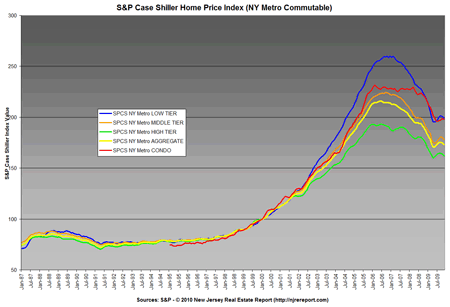From the Courier Post:
Home sales drop beyond expectation
Sales of existing homes, plumped up by government incentives in November, melted 16.7 percent in December, the largest month-to-month drop in 40 years. The steep decline, reported Monday by the National Association of Realtors, was worse than the 10 percent drop predicted by economists.
Overall, prices fell dramatically in 2009, declining 12.4 percent nationwide to a median of $173,500, the largest decline since the Great Depression.
…
But the most recent numbers for New Jersey — for sales in the third quarter — indicate prices are still softening.
“The good news is that homes are still moving, even if the price points are lower,” said Allan Dechert, president-elect of the NJAR and co-owner of Ferguson-Dechert Real Estate in Avalon.
In Burlington County, the median sales price for an existing, single-family home slid 7.4 percent compared to the same quarter a year ago, from $247,000 to $228,000.
In Camden County, the median price inched down 3.3 percent, from $203,200 to $196,400. In Gloucester County, the median price shed 10.8 percent, from $232,100 to $207,100.
From the Philly Inquirer:
Philadelphia-area existing-home sales down in December
The end of the first housing tax credit, as expected, took its toll on sales of existing homes in December, national and regional data show.
Sales fell about 35 percent in December from November in the eight-county Philadelphia region, according to a Prudential Fox & Roach HomExpert report.
Nationally, the month-to-month drop was 16.7 percent, according to the National Association of Realtors.
…
Some economists question whether the extended credit will jump-start the real estate market as much as the first one did.
“So far, the second credit appears to be having a minimal effect,” said IHS Global Insight economist Patrick Newport.
“Mortgage applications to purchase homes [the four-week moving average] are near their lowest level since 1997,” he said. “Applications are down despite the fact that mortgage rates, which are at historically low levels, are likely to go up during 2010.”
Newport said he believed sales would be weaker in 2010 than in 2009.
Prices fell 3.2 percent year-over-year in the eight-county Philadelphia region, but that reflects the continued presence of first-time buyers in the market, with or without the tax credit, snapping up lower-priced homes.
From the WSJ:
Existing-Home Sales Plunge
Home sales plunged in December, raising fresh concerns over the housing market’s ability to recover when government support winds down.
Sales of previously owned homes fell 16.7% from November to a 5.45 million annual rate, the National Association of Realtors said Monday, after a looming tax-credit deadline pushed buying decisions into previous months. The drop brought the pace of sales down to the lowest level since August.
The government’s first-time home-buyer tax credit was initially scheduled to end Nov. 30, and there was a race to finish deals before it expired. But the tax credit was eventually extended until spring, complemented by an additional tax break for repeat buyers.
For all of 2009, there were 5.16 million home sales, up 4.9% from 4.91 million in 2008. It was the first annual sales gain since 2005.
Although economists expected Monday’s report to show declining December home sales, few thought they would fall so sharply. The decline called into question the sector’s ability to bounce back.
“We have a very fragile housing system,” said Michael Carey, an economist with Calyon Securities in New York. He worried that as the government withdraws support from the housing market, prices could begin slipping again. That would put more homeowners into the position of owing more on their mortgage than their home is worth and could lead to another wave of foreclosures.
…
Regionally, December sales fell 19.5% in the Northeast, 25.8% in the Midwest, 16.3% in the South and 4.8% in the West.


